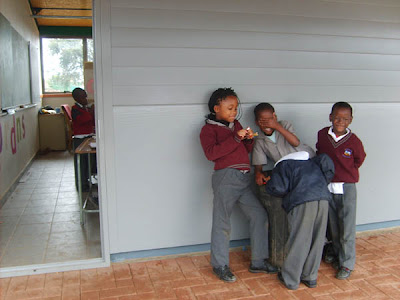 Special needs
Special needsNote; The school on which Bianca wrote her article and where she did her photography practical is not the same school.
Practical skills show the learning progress of severely mentally disabled pupils better than the academic curriculum.
This is according to the vice principal, Gadi Modisha, of Tshegofatsong Special School in Mamelodi which caters for severely mentally handicapped children. She explains that many students cannot spell their own names or remember how to count further than ten, but if they are given practical work to do, such as crafts, they are fully capable of completing the project.
“All learning is integrated,” said Modisha, who explained that through beadwork the students learn to count and arrange the colours in sequence to achieve a final product. Therefore, the students “achieve mathematics indirectly” added Modisha.
The curriculum is made up of 80% life skills (leather work, home economics, bead work, art and employment skills) and 20% academic skills (numeracy and literacy). But, Modisha says, there aren’t enough facilities for the practical work due to the school’s lack of financial resources.
The teachers try to sell the learners’ craft projects at markets in Gezina and closer to central Pretoria but they say it is not a big source of income.
According to Modisha, only a few of the learners who graduate from Tshegofatsong get permanent work. Other learners may get training at a place of employment but aren’t kept on a permanent basis.
Johannes Manamela, a graduate from Tshegofatsong, currently has a full-time job and a wife and child. His father, Mr Manamela who works at Tshegofatsong, says his son is doing well.
Pauline Magagula, head of the senior phase, recalls one graduate, Lerato*, who was not good with numbers. When Magagula went to find work for Lerato at a clothing store, she told the manager not to give Lerato any work involving numbers.
When Magagula returned to the store a few months later to check on Lerato, she was surprised to hear that Lerato was working with labels. “I called out a number... and asked her to fetch the box with that number. And she got the right box,” said Magagula.
Magagula said she had many students who excelled in their practical work. One special case to her was of an autistic learner who, because of her disability, could not sit still and continued repetitive arm movements. She was given some bead work to do, and sat calmly and did the bead work.
*Not their real names.






No comments:
Post a Comment